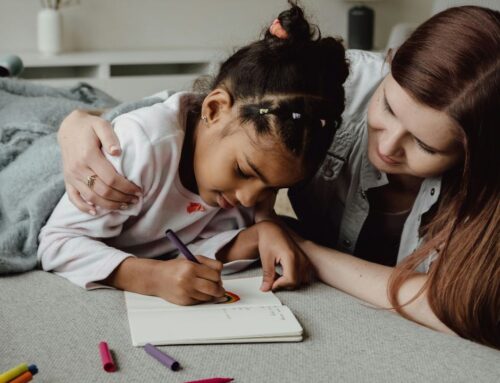Do you remember your science fair projects from when you were a kid? Is there a particular project that will live in your memory forever? Chances are, there’s at least one that came to mind right away!
There’s something magical about completing a science fair project. They capture your imagination and stimulate your senses. Perhaps it was the excitement of exploring something you were interested in, or the frustration and persistence that came with trial and error. Maybe it was the creative aspect of making your beautiful posterboards, or the achievement you felt when you solved the math problem that answered your project’s lingering question.
Our science-loving HomeLearners Network (HLN) Guide, Heather Turnbull, has been mentoring learners through science fairs for over 25 years! She coaches local learners who’ve excelled at regional science fairs and are now pursuing nationals. She says, “Science fairs are an encompassing learning opportunity where kids can combine the learning they’ve done in a practical way. They get to write, record, design, and bring their ideas into action!”
We sat down with Heather to explore the benefits of science fairs for kids, and how your family can get involved through SelfDesign, HLN, or local opportunities. She also shares helpful tips for parents and guardians.
Science fairs build skills and help kids find new interests
 Through science fairs and projects, learners can explore the ideas that excite them, guiding them toward deeper passions or opening doors to new ones.
Through science fairs and projects, learners can explore the ideas that excite them, guiding them toward deeper passions or opening doors to new ones.
“For some, maybe making the poster is their favourite part, so they decide to pursue more design-related activities. Others may enjoy the statistical or mathematical elements. Perhaps the science project wasn’t the point at all, and they simply wanted an opportunity to do a lot of coding,” says Heather. “I’ve seen lots of science fair projects turn into scholarships and lead kids towards their future careers.”
Science projects also help develop critical skills, such as problem-solving and clear communication, as well as academic skills like procedural writing and mathematics.
“Science can be frustrating and encourages resilience. It can challenge us to think about things in different ways and brainstorm pathways forward,” says Heather. “But most importantly, science projects give kids the feeling of pride through exploration, examination and completing something. Even if they proved something wrong, they’ve still proved something.”
How families can become partners in discovery
A science fair or project can spark learning and connection for the entire family! Not only is your role as a parent to provide supervision and safety, but you can also help your child discover new perspectives by bringing your own lens and providing guiding questions. “In many cases, the adults are doing the learning right alongside their learners!”
The most significant piece of advice Heather has for parents and guardians is to keep an open mind. She says, “When kids ask questions about the world, they’re asking them for a reason: because there’s a gap in their knowledge or a space missing in their understanding they’re looking to fill. Rather than answering their questions with what we understand, let them explore it. Let them look at it from a scientific angle and try it!”
Heather’s tips for finding the perfect project
 If your young scientist is struggling for ideas, Heather suggests visiting online resources like Science Buddies to take their Topic Selection Wizard quiz! The quiz takes approximately 30 minutes and provides a handful of age-appropriate projects related to your child’s interests.
If your young scientist is struggling for ideas, Heather suggests visiting online resources like Science Buddies to take their Topic Selection Wizard quiz! The quiz takes approximately 30 minutes and provides a handful of age-appropriate projects related to your child’s interests.
“At the brainstorming stage, I like to ask learners to consider the things they love, the things they don’t love, and the things they’d like to change,” says Heather. “Everybody thinks what you really love is where you should draw from, but the truth is, things you don’t like or things you want to change are often more powerful motivators.”
Heather also suggests visiting science fairs near you when they happen in the winter and spring. “You and your kids can see the innovations and inventions of other learners, discover what they’re passionate about, and talk to them about what sparked their idea. It’s great to stand in a room where there are so many different ideas represented in one space!”
Enter a mini, school-level, or regional-level science fair
If your learner would love a fun way to dive into a science project they’re interested in and participate in a mini science fair, check out Heather’s HLN activity, Experiment and Explore: Science Fair, happening on January 8!
Over eight sessions, kids ages 10 to 16 will use the scientific method to develop, test, and ultimately share the results of their experiments with their peers. They’ll enjoy brainstorming together, learning how to find background information, and communicating their observations and findings effectively.
For younger learners ages 5 to 8, check out Experiment and Explore Junior with Alecyn, which starts October 15! Kids can join a junior science fair, learn about the scientific method and the inquiry process, and apply it to their very own science project!
SelfDesign learners from grades 7 to 12 are encouraged to sign up for our school-level science fair and can enter their regional science fair as an independent entry. Check out the Regional Fair Finder to see upcoming science fairs near you!







